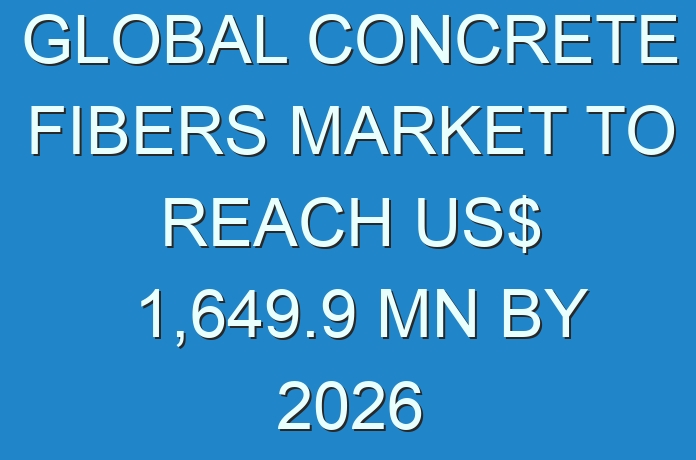
The global concrete fibers market was valued at US$ 963.8 Mn in 2017 and is anticipated to expand at a CAGR of 6.2% from 2018 to 2026, according to a new report titled ‘Concrete Fibers Market: Global Industry Analysis, Size, Share, Growth, Trends, and Forecast, 2018–2026,’ published by Transparency Market Research (TMR) The global concrete fibers market is driven by the rise in building and construction activities across the globe.
Rising Demand for Concrete Fibers from Building & Construction Industry to Drive Market
The global concrete fibers market is primarily driven by advancements in the building & construction industry. The building & construction segment is estimated to account for a large share of the market. The segment is also anticipated to expand at a considerable growth rate during the forecast period. Steel and glass concrete fibers are primarily used in building and construction activities. Glass fibers are used for architectural cladding. Steel fibers are used to build various transportation infrastructures such as tunnels, bridges, and roads, as these provide higher strength as compared to other fibers. The construction industry in the U.S. is estimated to expand at a faster pace than that in China in the next 15 years. Construction is projected to rise in the southern states in the U.S.
Request PDF brochure
https://www.transparencymarketresearch.com/sample/sample.php?flag=B&rep_id=6269
Surge in Demand for Non-corrosive Materials to Drive the Concrete Fibers Market
Reinforced concrete is extensively used in various construction activities. Over two billion tons of reinforced concrete is produced annually across the globe. It has many advantages including lower cost, easy availability of raw materials, higher fire and weather resistance, and higher compressive strength as compared to wood. However, concrete lacks tensile strength and ductility. The global cost incurred due to corrosion of buildings is estimated at US$2.5 Trn annually. The estimated cost incurred to repair corroded infrastructure is US$ 300 Bn annually in the U.S. alone. Synthetic fibers, glass fibers, and steel fibers are used to combat corrosion. Corrosion is a prevalent issue across the globe, which can be overcome with the use of fiber reinforced concrete. Fibers help reduce crack widths within a concrete sample. These cracks cause deterioration of any concrete structure, as they prevent corrosive materials from reaching the rebar. These fibers improve other properties of the concrete such as its ability to induce strain hardening to the areas where the post cracking tensile stress is higher than the tensile strength.
High Production and Operating Cost to Restrain the Market
Ductility of plain concrete is enhanced by adding fibers. These fibers improve the tensile and flexural strength and allow its use in structural elements with no passive or active reinforcement. Production of synthetic-based concrete fibers require advanced technology; therefore, its production cost is higher than that of traditional materials. Additionally, advanced technology is required to enhance the durability and to make concrete fibers lightweight, which is not met easily with the use of other materials such as conventional concrete. Concrete fibers can reduce construction time, labor, and material costs, and significantly decrease ongoing maintenance costs. High costs associated with concrete fibers are likely to limit its widespread use. This, in turn, is projected to hamper the market.
Buy Now
https://www.transparencymarketresearch.com/checkout.php?rep_id=6269<ype=S
Steel Fibers Segment to Dominate Global Concrete Fibers Market
Based on product, the concrete fibers market has been divided into synthetic fibers, glass fibers, blended fibers, steel fibers, basalt fibers, animal origin fibers, and cellulose fibers. Steel is likely to be a highly attractive segment of the concrete fibers market during the forecast period. It constituted a major share of the market in terms of value and volume in 2017, as steel fibers help improve resistance to fracture, disintegration, and fatigue.
Transportation Infrastructure Segment Dominates Concrete Fibers Market
In terms of application, the concrete fibers market has been segmented into building & construction, transportation infrastructure, mining, industrial flooring, and others. Transportation infrastructure is anticipated to be a highly attractive segment during the forecast period. However, the segment is anticipated to expand at a sluggish pace during the forecast period.
Request Discount:
https://www.transparencymarketresearch.com/sample/sample.php?flag=D&rep_id=6269
North America Dominates the Global Concrete Fibers Market
Based on region, the concrete fibers market can be segregated into North America, Europe, Asia Pacific, Latin America, and Middle East & Africa. North America is estimated to be a highly attractive region of the global concrete fibers market during the forecast period. The region held a large share of the global market in 2017. Major manufacturers of concrete fibers are located in North America.
The market in Asia Pacific is anticipated to expand at a rapid pace during the forecast period. Consumption of concrete fibers is expected to be high in the region during the forecast period. Increase in the number of highway projects and rise in investments in the construction sector are major factors that are anticipated fuel the concrete fibers market in Asia Pacific during the forecast period.
High Degree of Competition among Market Players
High degree of competition exists among market players operating in the concrete fibers market. The market is dominated by few big players and is moderately consolidated. Key players operating in the concrete fibers market include Sika Group, BASF SE, Bekaert, GCP Applied Technologies Inc., Owens Corning, ABC Polymer Industries, LLC, Nycon Corporation, Fibercon International Inc., and Synthetic Resources, Inc.





